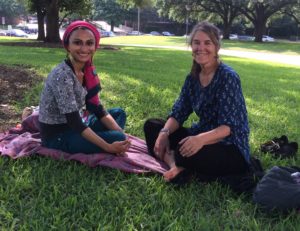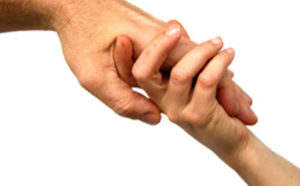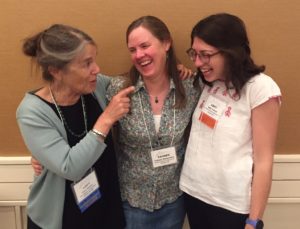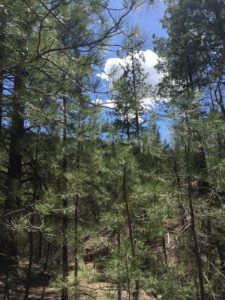
I had a birthday recently, a reminder (as if I needed it) that the ranks of those younger than me are growing, and the numbers ahead of me are dwindling. And perusing the paper on that special day, I read that composting human bodies is now legal in Washington state, the ultimate in recycling. It made me think about life and how to make the most of every stage, every year, even the end. I am not ready for composting, nor do I think I will ever be ready to join the teeming activity of a compost heap if it looks anything like mine.
All this makes me think about my responsibility to those aspiring facilitators and mediators, who are behind me in line, wanting a career like mine. I am still working as a facilitator and mediator because I can still do it and I love it, but in so doing I am taking work away from some younger aspiring mediator. We hear about a crisis in some universities where long-lived professors refuse to give up teaching, and lower level associates, ready to move upward, are stuck waiting in line for the opening that never comes. I do not want to be that old fogey unwilling to step aside, but I want to practice at least a little as long as I can. Here is my solution: I mentor.
Breaking into the environmental conflict resolution business, my professional home, is not easy. Those hoping for a career have difficult choices. Graduate school may give you an advantage in the

job market, but it is expensive and delays diving into the work itself. The competition for positions in conflict resolution firms is fierce, and entry levels may be filled by interns willing to work for little. Hanging out your shingle takes incredible courage, and probably a small bank roll. And no matter how you choose to tackle the professional establishment, you will need connections. I am proud to have become a “connection,” someone on the inside who may be able to help boost a dedicated newcomer into the field.
For decades I have been mentoring those behind me in line. We find each other in a variety of ways, sensing that we share a love of the chaotic, an appreciation for the gray areas, a desire to help people communicate, find common ground and maybe even peace. In this increasingly hostile and tone deaf environment, finding a like-minded soul fills me with excitement.
She may be the agency’s logistic person who sets up the public meeting, then watches the evening unfold, participants full of passion, anger, hope and fear. She may come up to me after it’s all over and say, “How do you do that, deal with angry people like that? I wish I could do that.” Aha, I think, she may be my next mentee. We chat, have coffee and if there is spark there, she may ask her boss for an afternoon off to work with me on facilitation skills and then assist me at the next meeting.
Or, he may have come out of college with a degree in anthropology and a special interest in cultural conflict. We meet for coffee (yes, I have a lot of coffees), and with encouragement he hones mediation skills as a volunteer in the schools working with parents, staff and students to resolve conflicts. It is frustrating work, but he is drawn to it and wants a career where he can help mediate multi-cultural conflicts in the natural resource arena. We talk about options and he decides to go for a PhD in conflict resolution from a prestigious eastern school. I follow his academic journey, cheering from the sidelines. Now, many years later he heads a conflict resolution center for the Army Corps of Engineers, working with tribes and other communities impacted by Corps plans or projects.
Or, two young women, recently hired by a major conflict resolution firm, read my book, Common Ground on Hostile Turf, and email me. Would I be able to have a conference call with them to talk about a thorny issue they are dealing with? They would love to “bounce things off me.” I am a very happy “bouncer off-er” and we have several calls and one in person meeting over the course of two years. One of them is beginning to write about her experiences facilitating and I am honored to read them and reflect with her about what she wants to say.
And  now, there is Jasmin. She is from Los Angeles, first in her family to go to college, with an undergraduate degree from Berkeley. She used the internet to find environmental mediators working in cross-cultural settings. She started calling cold, and when she got to me, things warmed up! We have never met, but for the past year we have worked through her struggles about next steps. She is eager to get to work, but understands that graduate school may help her get the position she wants. In the meantime, she interviewed for a few jobs that might have been stepping stones, but were not really on her path. And then the ideal spot came along with Americorps. In July she will begin in Alaska, organizing outreach and conferences as an environmental health coordinator for tribal communities. She will be designing and facilitating processes to enable communities to collaborate and take a more active role in promoting their health. I am so proud of her and can’t wait to hear the news from Alaska.
now, there is Jasmin. She is from Los Angeles, first in her family to go to college, with an undergraduate degree from Berkeley. She used the internet to find environmental mediators working in cross-cultural settings. She started calling cold, and when she got to me, things warmed up! We have never met, but for the past year we have worked through her struggles about next steps. She is eager to get to work, but understands that graduate school may help her get the position she wants. In the meantime, she interviewed for a few jobs that might have been stepping stones, but were not really on her path. And then the ideal spot came along with Americorps. In July she will begin in Alaska, organizing outreach and conferences as an environmental health coordinator for tribal communities. She will be designing and facilitating processes to enable communities to collaborate and take a more active role in promoting their health. I am so proud of her and can’t wait to hear the news from Alaska.
These days I am probably spending as much time mentoring as I am working, and what fun it is. I am building that line of young people behind me, giving advice, helping them make connections, and promoting their careers. In my blog, I am careful to stay away from politics, but I can’t help but suggest that aging candidates of any party running for office might consider how best to use the expertise they have gathered over years of service. Why not take that wealth of knowledge, connections and experience and throw it behind a younger candidate? I know it’s hard to give up center stage, but pick your favorite rising star. Nurture the next generation and be a hero.

[August 22 update: Last night I had dinner with one my mentees from long ago, Tahnee Robertson, who has her own very successful firm in Arizona, Southwest Decision Resources. She brought with her one of her mentees, Abby Fullem, so we had three generations of mentoring at one table….which makes me a grand-mentor, and Abby is now my “grand-mentee.” I couldn’t be prouder!]


Bravo! If everyone did this we’d live in a parallel universe…
…ahhh, for that parallel universe!
Hi Lucy – this blog resonates with me. I feel strongly that we need to step aside and I am frustrated by my friends who insist they keep working in those top level, highest paying jobs well into their 70s. Mentoring is hard work. But how useful it is to do what you are doing. You pass along years of experience – and contacts! You’re living this stage of your life exactly like you’ve lived all of the earlier stages – thoughtfully and compassionately. Bravo! And, talking about helping young people make those connections made me think of a great one that I can make for your mentee in Alaska. Let’s talk!
Thanks so much, Kay, for jumping in to help my mentoring efforts! That’s awesome.
Glad to see the tradition of intercultural training and awareness goes on. On going Climate change mKes these skills crucial for our species survival.
I appreciate that, Pat. Thank you.
Hi Lucy — I love this! I ran an agrarian apprenticeship program for 5 years, through the Quivira Coalition — what I loved the most was the mutually beneficial relationship between mentor and apprentice. Both sides are critical, both need each other equally. I love your enthusiasm for the next generation and your willingness to help us follow in your footsteps… and I also love that you’re still out there, doing the work as a seasoned and talented professional who really knows her stuff! Looking forward to many more coffees with you!
This is what I love about mentoring! So beautifully said and so true about the mutually beneficial relationship. Proud to be a mentor for you, and let’s have coffee!
I so remember sitting in a backyard in Santa Fe with you when I was just entering the field and soaking up inspiration and ideas–while drinking coffee! That was many many years ago, but on every project I do–I think of your mentoring and how I can help pass the torch along. You have inspired many—right from the start of your career! Big hug, Kristi
I am so touched, Kristi.Thank you for the memory, and for being a mentor yourself. You have so much to offer those coming behind — they are lucky mentees!
Lucy, I am happy to see this concept embraced openly. When I retired 3 years ago and said this was my motive, I was disappointed how many of my age peers shared they would struggle to embrace this concept. I think it is especially important being a woman in a male-dominated field (geology), and being a person of color who never had an African-American, Asian-American or American Indian teacher from elementary school through graduate school, to mentor from the position of having both succeeded in my career and embraced stepping aside for the next generation(s). Also, when asked to volunteer for a role because of my senior status, I respond while I am honored to have my career regarded positively, I retired so younger qualified persons could step up, and I give them a list of names to call, if they allow me.
So good to hear from you, Rhea! I really appreciate your comment and agree that for young people of color it is a great gift to have a mentor that reflects their experience and their identity. And your stepping aside to make room for the next generation is really admirable…. I am stepping aside with one foot, the other dragging a bit, but I too have a list of up and comers that I often use for would-be clients. You are a treasure — in many ways! and I always enjoyed working with you.
What a wonderful solution to a very real problem! Applies to every field I can think of so far! With the cost of higher education and no solutions in sight, apprenticeship and mentoring could be a way around the burden so many young people are accepting financially for years to come, a form of financial slavery.
Great to hear from you, Goose. And yes, it seems like an old-fashioned, but tried and true, way of bringing young ones into any field.